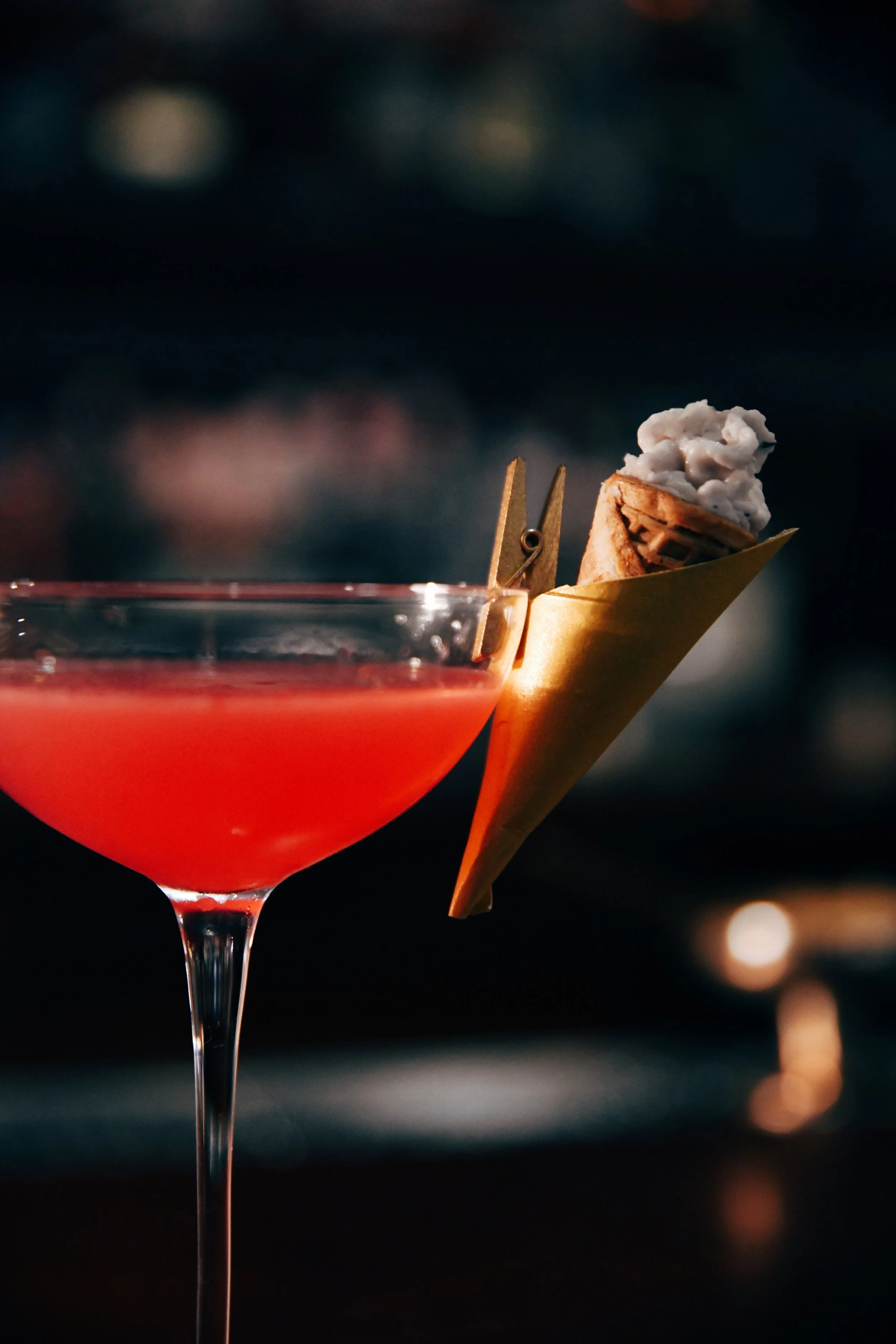Around Town: Rick Mullins
In her new series, Food Editor Grace Pritchett shares a drink or two and a bite to eat with some of KC’s most prominent food personalities– and shares the insights and good times with us!
Rick Mullins. Photo by Grace Pritchett
Rick Mullins started cooking in Kansas City eight years ago and has since worked with Kansas City favorites like Bluestem, Bread & Butter Concepts, and The Nelson-Atkins Museum of Art. Now he stands as Executive Chef of Café Sebastienne at Kemper Museum of Contemporary Art, where he works with his kitchen team to create menus that complement the art and appeal to international crowds. His perfect day in Kansas City involves staying home with his cats and he discovers new restaurants by driving around random neighborhoods. Basically, he’s my hero.
I sat down with Rick at his favorite restaurant in town, Jarocho, to talk about Mexican cuisine and the creative process behind his menus.
Café Sebastienne. Photo by Anna Petrow
What made you want to get into the industry in the first place? What got you interested in cooking?
I started out watching Anthony Bourdain and I went to culinary school for a year. Then a couple of things happened. Simultaneously, I stopped drinking and doing drugs and I dropped out of culinary school. What comes from culinary school is never going to be personal and the only way food is going to be good is if it's personal. So I dropped out, went to rehab, got clean, and started really focusing on food.
Addiction is poor time management and I think a lot of issues come from poor time management anyway. I learned how to manage my time by being overly obsessed and absorbed with food. I taught myself how to cook after that. I obviously learned from everyone I worked with, but I found there was no need to go to school.
Were you taking jobs at entry-level in restaurants? Like dishwasher, busboy, etc.
Nah, I worked in the bars. I didn't have any cooking experience. After a few cooking jobs, I started Soil Collective with my friend, Mickey Priolo. It was a collaborative effort and a political statement on our environment. That pushed me even further because all the shit that I couldn't do while I was at restaurants was fair game with this. This isn't a dig at anyone; it's just rare to have restaurants let you put cured venison heart on a menu, it's the truth of it. So we found a place outside of our workplaces that we could experiment with things outside of the norm and had a direct impact on our surrounding area.
That was the way I learned the most: with trial and error on my own. Once I figured out what ingredients were available to me here and how to procure them, all I could think about was how to use them. That helped me get to where I am now. I've been professionally cooking for eight years and that started with barbacking.
Shrimp Cucaracha- jumbo shrimp flash fried and covered in spicy sauce- at Jarocho. Photo by Grace Pritchett
Why did you choose Jarocho and what do you love about this place?
Carlos is the shit. We've worked together, doing benefit dinners. And I'm pretty obsessed with Latin American cuisine, Mexico in particular, so I get pretty excited whenever I see that cuisine highlighted in Kansas City. It's nice to have a seafood restaurant that is Mexican-inspired in the city.
Where do you think your interest in Latin American food started?
In Mexico, for sure. I kind of had an interest in it before but the interest became stronger after visiting Mexico. I started to become obsessed with moles– we always have some iteration of a mole on our menu somewhere. It's taken about two years of getting the mole to where I want it with my whole process. It's a goal of mine to figure out how to make a completely locally-sourced mole. It's almost impossible with the spices. The spices can't grow here but you know, we're getting there.
Café Sebastienne. Photo by Anna Petrow
You seem like someone who approaches other culture's cuisines in a way that you're still paying homage to the culture without taking from it.
Exactly. I've always been afraid of being called out for shit like that. But I don't really care if they do, to be honest with you. It's one thing for me to be like, I'm a Mexican chef, which I've never said nor will I ever be. It's not my intention. But to let that influence my cooking, people do that everywhere. There are famous chefs in Mexico that use French techniques. People don't talk shit on them.
I just think there can be a lot of hypocrisy. People sit on their high horse and call out other people for doing what they love. As long as they're being respectful with what they do and respectful to people while they do it, then why is it your business? If you don't want to go, then don't go.
And you know, I hope we're getting away from the celebration of the chef as a singular entity.
If we're getting away from that idea, what are we moving towards?
Hopefully, we're moving towards the recognition of the entire kitchen and the entire operation. Servers deserve respect. Without front of house employees, the chefs would have no one to depend on. We can't run the food ourselves; that wouldn't go well. Hopefully, we're moving towards the consumers focusing on the entire experience of it. We should lose that illusion of celebrity status for chefs, we're just human beings.
I mean, I don't write every menu. We write the menus together as a team. My name isn't on the menu and I don't want it there.
Tomato and Melon Gazpacho with dried heirloom tomato at Café Sebastienne. Photo by Kenny Johnson
Have you always been this way with your kitchen teams?
I just hit a point where I got over myself. It shouldn't be about the chef. Chefs with egos are the ones who give us a bad name. Like, they’re the ones who yell at people. I realized that it doesn't have to be that way in work environments. It’s rare for my voice to raise above a normal level.
Because you can have authority without raising your voice.
But it's not even about authority now. It's about being able to rely on ourselves and rely on one another. It's more of a familial unit than "we work here." I bring people on that give a shit. And I bring people on that can think differently.
It's cool actually, because once you give people the freedom in their workplace, they take responsibility for their surroundings. Because it becomes theirs and it becomes a part of them. I don't need to go into my kitchen and yell at my team. I go into my kitchen and they've done what needs to be done. That means we spend less time delegating and worrying about cleaning up. We can just go in there and focus on being creative.
Grilled Carrot Salad with gazpacho powder, couscous, and chili oil. Photo by Kenny Johnson
In terms of the Artist Dinner Series with Café Sebastienne, what's your process like? How are you working with the individual artists to create unique menus?
For the first artist, Virginia Jaramillo, I looked at her painting we have in the Kemper collection, “Principle of Equivalence”. I used the colors in the painting to inspire the colors of the dishes, but then we went a little bit further and started researching what even the “principle of equivalence” is. It's physics with a philosophical spin. It’s like when you have an emotion and it leaves, it doesn't leave a hole, it leaves a space for another emotion to come in. The emotions have aspects of one another and they can feel the same. So with that in mind, one of our first courses was a gazpacho. We clarified the gazpacho until it was crystal clear. Then we took that byproduct and dehydrated it to turn it into a powder for the next course. So there was this movement of dishes reappearing and jumping around in the dinner.
What do you think you would be doing if you weren't in the restaurant/food industry?
Uh. I'd probably be dead. I've always been in some form of creative endeavor, so cooking just clicked and made sense. I think if I didn't have that then I would be in a very different place right now. Probably not as *here*.
Cooking satisfies me. I don't need to make a bunch of money doing it. I don't need any shine. I don't need any awards. I'm gratified going into the kitchen and cooking food and being with people who like cooking food.
Visit Café Sebastienne for yourself to try Chef Rick Mullins and his team’s incredibly unique and locally sourced cooking.












